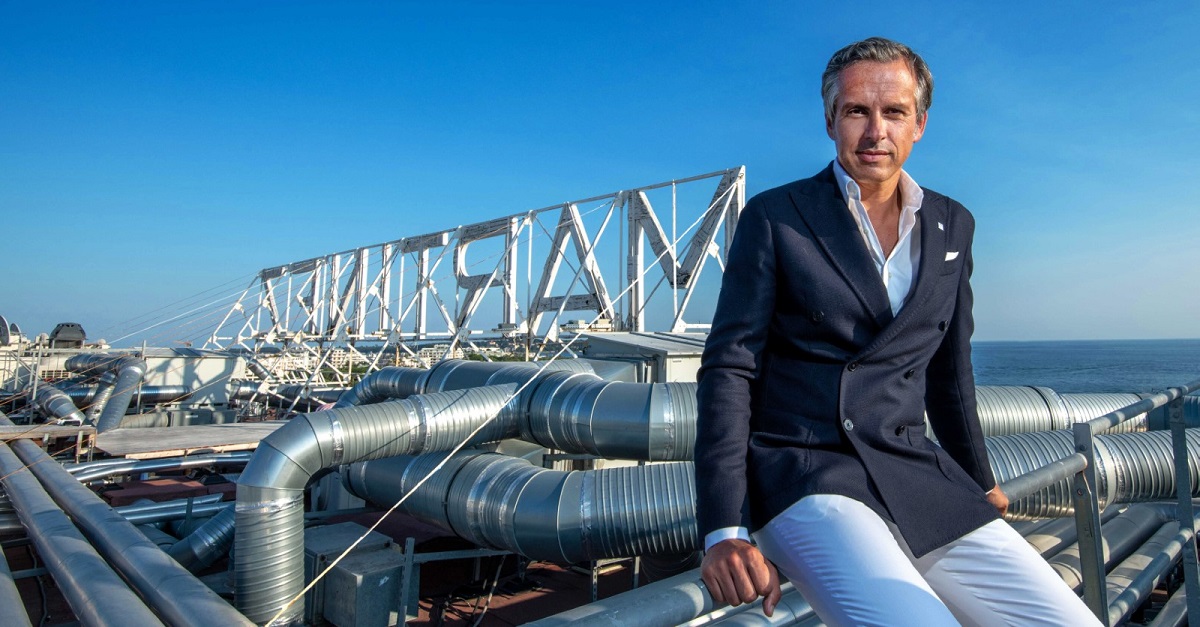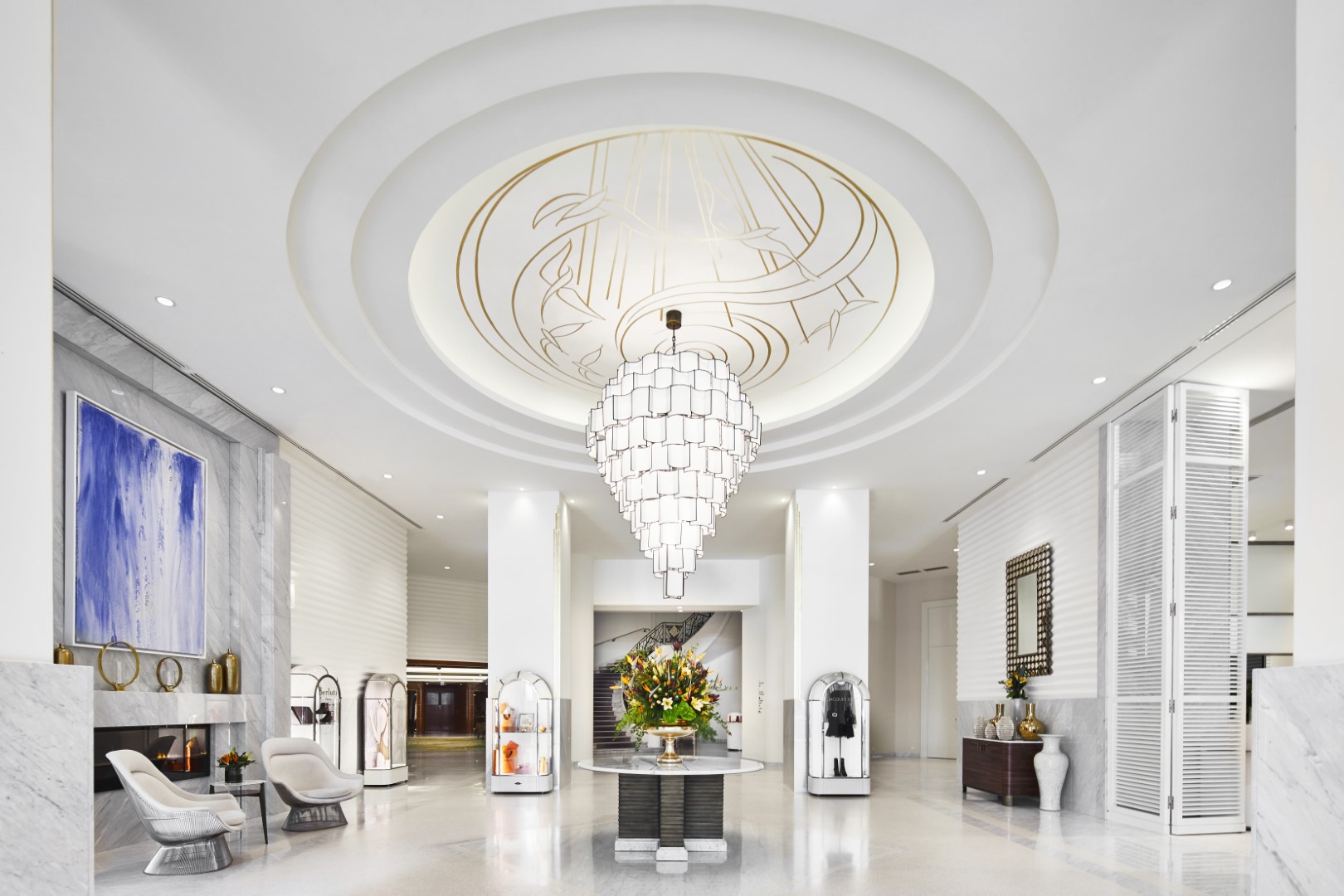The luxury Interview of...

Yann GILLET
General Manager – Hôtel Martinez
French luxury has a distinctive duality: It is at once traditional and iconoclastic
Yann Gillet, 51, has been General Manager of the Hôtel Martinez in Cannes since the summer of 2019. With a BTS degree in Hotel Management from the École Hôtelière de Paris and having earned a Master’s 1 degree from the Strasbourg École Supérieure de Management et de Gestion in 1994 and a Master’s 2 degree in Finance from the IAE de Paris business school in 1999, he has held a variety of positions in operations management and general management with Hyatt hotels, of which the legendary Martinez is part through The Unbound Collection by Hyatt.
His career with the Hyatt hotel family began in 2002 and crisscrossed the globe with his starting as Director of Operations at the Hyatt Regency Casablanca. In 2007, he took over as General Manager of the Hyatt Regency Johannesburg in South Africa, then held the same position at the Park Hyatt Chennai in India (2011), the Hyatt Regency Paris-Charles de Gaulle (2013), and, lastly, the Grand Hyatt São Paulo in Brazil (2016).
Since 2019, he has been guiding the destiny of the Hôtel Martinez, an establishment whose history is inseparable from that of the Cannes Film Festival. The Art Deco-style Hôtel Martinez, which opened in 1929, has 411 rooms and suites renovated to capture the Riviera spirit of the 1930s, as well as 15 modular event rooms spanning 2,500 square meters (27,000 square feet) that can accommodate conventions, celebrations, and seminars in any season. The hotel has, each year, played host to the planet’s biggest cinematic stars, including members of the Coppola family, Jean-Paul Belmondo, Sophia Loren, Alain Delon, Steven Spielberg, Gérard Depardieu, Catherine Deneuve, and Pedro Almodovar.
In October 2021, Bureau d’Image, a consulting and training firm for luxury hotels, and the Hôtel Martinez entered into a partnership, an extension of the long-established partnership between Bureau d’Image and Hyatt France (the Palace Park Hyatt Paris-Vendôme being the firm’s very first partner in 2005). In October, Bureau d’Image provided Hôtel Martinez with grooming training for department managers and operational teams. This introductory training was provided with a view to a tailor-made calibration of new training for the year 2022.
Bureau d’Image: How would you define luxury?
Yann Gillet: Luxury is all about pleasant surprises. The surprise that comes at the right time. That’s personal and tasteful. Little pleasures that someone concocted for us without our ever dreaming that that person could have even given them thought or guessed what would delight us.
BI: Is there such a thing as French luxury and, if so, how would you describe it?
YG: French luxury does exist and, in my opinion, has a distinctive, twofold character. On the one hand, it is very classic, very traditional, like some upscale hotels and restaurants. On the other hand, it is very innovative and iconoclastic. This is how I’d describe French luxury: It retains the basics of classic while being on the cutting-edge of innovation…at times bordering on provocation.
BI: What well-known figure do you feel best embodies luxury today?
YG: For me, there are two renowned figures who serve as clear examples of exactly this classicism/innovation duality. First, Anna Wintour, who embodies the conventional codes of luxury and elegance. I’m particularly fond of her master classes. And for the innovative expression of luxury, the person who comes to mind is Virgil Abloh, the trend-setting artist-designer and stylist. He establishes fashions and unearths talent. He was appointed Artistic Director of the Louis Vuitton Men’s collections in 2021.
BI: What major developments in luxury have taken place over the last few decades? What will the luxury hotel industry of tomorrow look like?
YG: The major developments center on digitization. It’s imperative, yet very challenging, to incorporate an elegant and luxurious experience into digital. The luxury of tomorrow entails using solutions to better understand technological tools without depersonalizing the relationship with guests. We’ll have to find the right codes in digital communication so as not to descend into a promotional bent that doesn’t respect the brand. The other crucial marker of the last few years is time: time that can no longer be taken. Speed and efficiency are part of luxury. People don’t wait anymore. The time devoted to a gourmet lunch or dinner, for example, has become shorter.
BI: How do luxury companies ensure they stand out?
YG: Two things that make luxury businesses distinctive are the round-the-clock availability of staff and services, and extreme efficiency of execution. But luxury is also simplicity and kindness, benevolence. Just because a service, product, or proposition is expensive doesn’t mean it has to be complicated. Luxury doesn’t have to be ostentatious. It’s hidden in small details that exude simplicity. The fragrance, the flowers, the service. Luxury shouldn’t be stressful and even finds inspiration in the art of feng shui.
BI: How would you describe a successful customer experience in a store, in a hotel, or while traveling? What are the key factors to delight and retain customers?
YG: A successful experience is a never-ending, pleasant surprise. It’s also the invisibility of the service. Everything is carefully thought out, planned, prepared, but the customer shouldn’t see any of this and shouldn’t be subjected to the service, rendering it an obligation. The customer must be an active, creative participant in his or her experience.
BI: What’s your best memory in a luxury hotel?
YG: From one of my professional mentors, Michel Jauslin (a former top manager with Hyatt Hotels & Resorts), I learned the three things essential to comfort in the hotel industry: the quality of the bed, the quality of the air conditioning, and the quality of the shower. At the Park-Hyatt Paris-Vendôme, I was astounded by the Pierre de Paris stone shower, the rainshower, and built-in sink. All designed by renowned interior designer Ed Tuttle.
BI: What’s the most luxurious gift you’ve ever given?
YG: A dinner to celebrate my wife’s fortieth birthday in South Africa, at a splendid Singita lodge deep in the savannah, surrounded by lions. An utterly divine moment.
BI: What’s the most luxurious gift you’ve ever received?
YG: My being a Napoleon fan, my wife had booked a cruise on Ponant to Saint Helena Island for the bicentennial of the emperor’s death. This upscale cruise was scheduled to set sail in the spring of 2021, with historians Max Gallo and Franck Ferrand on board, but was canceled because of the pandemic.
BI: What’s a luxury you feel you couldn’t live without?
YG: The opportunity to swim in the Bay of Cannes all year round.
BI: What kind of leader are you? What principles guide your professional life and what are the demands of managing a luxury establishment?
YG: I have the same requirements for both myself and my staff: kindness and a thorough understanding of our guests. With patience and simplicity. That’s why it’s important for me to support my teams so they understand what our customers are experiencing. That’s why I encourage the staff to try the experience, to take the customer journey themselves. As far as substance and form go, I feel it’s also important to pay attention to what you say and how you say it, and I apply this to my staff interactions.
BI: What key quality do you demand of your staff?
YG: Kindness.
BI: Of what error or flaw are you most indulgent?
YG: Errors in grammar. I’ve become a bit more forgiving with time (smiles).
BI: Why is it so important to train your staff in superior customer service?
YG: We provide our staff with the customer service rules, tools, and codes. We teach them the routines, ensure they have the key skills, attractive uniforms – but what we can’t dictate is their attitude toward customers. We create the best conditions for our employees so that they can deliver the best of themselves, so that they show empathy, kindness, sincerity, authenticity. This attitude has to come naturally.
BI: Do you attach particular importance to the posture and interpersonal skills of employees in the luxury industry?
YG: Beyond interpersonal skills, which cannot be taught, we pay special attention to posture and know-how. We teach and train our employees in good posture, personal hygiene, and proper behavior. These are the fundamentals in the luxury industry and hospitality professions.
BI: Even once you’re a manager, do you still learn a bit more each day about luxury standards and practices, how to truly embody them?
YG: I sincerely believe that we must remain extremely humble in our work. I agree with Steve Jobs when he said, “It doesn't make sense to hire smart people and then tell them what to do; we hire smart people so they can tell us what to do.” The world is moving and changing so fast that we have to stay alert and inquisitive about everything. We have to listen to those in our professional entourage so we can continuously learn, grow, and try new things.
BI: What advice would you give young professionals?
YG: First, travel – for the multicultural richness it brings you. It lets you learn languages, encounter new cultures, religions, customs. Travel develops and strengthens your personality. Second, I think it’s essential to take chances, to be bold, to dare to try things.
BI: What do you recommend for men: a well-groomed beard or a close shave?
YG: I’m very traditional when it comes to this issue and prefer a close shave. A well-groomed beard is a subjective determination, and not everyone has the same grooming standards. So, it’s simply easier to choose a close shave.
BI: For women: for or against red nail polish?
YG: I’m for red nail polish. I find it very feminine and glamorous. Beautiful, elegant, and chic.
BI: For or against tattoos?
YG: I have nothing against them as long as they don’t show. You don’t put a sticker on a Ferrari.
BI: If luxury was a color, what would it be?
YG: Klein Blue.
BI: An animal?
YG: A cat. A Birman.
BI: An adjective?
YG: Optimistic.
BI: An emotion?
YG: Joy.
BI: A work of art?
YG: A Rachmaninoff concerto. Or Philippe Starck’s Juicy Salif lemon squeezer.
BI: A motto?
YG: “Mens sana in corpore sano” - “A healthy mind in a healthy body.”
BI: A virtue?
YG: Kindness.
BI: An historical figure?
YG: François Vatel, a butler and an extraordinary party planner during the reign of Louis XIV. Exhausted from organizing an extravagant banquet for the king and distraught about the late delivery of the seafood he intended to serve, he committed suicide on the spot.
